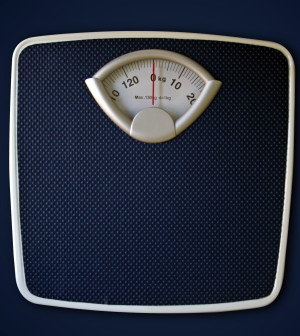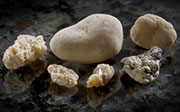- Could Your Grocery Store Meat Be Causing Recurring UTIs?
- Are You Making This Expensive Thermostat Error This Winter?
- Recognizing the Signs of Hypothyroidism
- 10 Strategies to Overcome Insomnia
- Could Artificial Sweeteners Be Aging the Brain Faster?
- Techniques for Soothing Your Nervous System
- Does the Water in Your House Smell Funny? Here’s Why
- Can a Daily Dose of Apple Cider Vinegar Actually Aid Weight Loss?
- 6 Health Beverages That Can Actually Spike Your Blood Sugar
- Treatment Options for Social Anxiety Disorder
Some With Kidney Stones Might Have Calcium Buildup in Blood Vessels: Study


Some people who develop recurring kidney stones may also have high levels of calcium deposits in their blood vessels, and that could explain their increased risk for heart disease, new research suggests.
“It’s becoming clear that having kidney stones is a bit like having raised blood pressure, raised blood lipids [such as cholesterol] or diabetes in that it is another indicator of, or risk factor for, cardiovascular disease and its consequences,” said study co-author Dr. Robert Unwin, of University College London. Unwin is currently chief scientist with the AstraZeneca cardiovascular & metabolic diseases innovative medicines and early development science unit, in Molndal, Sweden.
The main message, Unwin said, “is to begin to take having kidney stones seriously in relation to cardiovascular disease risk, and to practice preventive monitoring and treatments, including diet and lifestyle.”
Some 10 percent of men and 7 percent of women develop kidney stones at some point in their lives, and research has shown that many of these people are at heightened risk for high blood pressure, chronic kidney disease and heart disease, the researchers said.
But study author Dr. Linda Shavit, a senior nephrologist at Shaare Zedek Medical Center in Jerusalem, and her colleagues wanted to find out whether the heart issues that can occur in some of those with kidney stones might be caused by high levels of calcium deposits in their blood vessels.
Using CT scans, they looked at calcium deposits in the abdominal aorta, one of the largest blood vessels in the body. Of the 111 people in the study, 57 suffered recurring kidney stones that were comprised of calcium (kidney stones can be made up of other minerals, depending on the patient’s circumstances, the researchers noted), and 54 did not have kidney stones.
Not only did the investigators find that those with recurring kidney stones made of calcium have higher calcium deposits in their abdominal aortas, but they also had less dense bones than those who did not have kidney stones.
Earlier research has shown that calcium buildup in blood vessels frequently goes hand in hand with bone loss, which suggests a link between osteoporosis and atherosclerosis, or hardening of the arteries.
Dr. Steven Fishbane, vice president of dialysis services at North Shore-LIJ Health System, in Great Neck, N.Y., was cautious in interpreting the results. “Patients should not be panicked by the findings, but they are worth discussing with your physician,” he advised.
“Many people who develop a kidney stone will go on to form more stones,” Fishbane said. “There is a risk of recurrence, although it can also be an isolated event.”
Shavit noted that genetic factors are responsible for the development of kidney stones in about 50 percent of cases, but diet and lifestyle also play a part. Not drinking enough water or consuming too much calcium, potassium or salt in your diet are major risk factors for kidney stones, she said.
So, Shavit added, individuals with kidney stones should be monitored for heart disease in various ways, including having CT scans that measure both calcium deposits in blood vessels and bone density, and by counting the number of kidney stones that develop and where they are located.
Dr. Suzanne Steinbaum, a preventive cardiologist at Lenox Hill Hospital in New York City, agreed that CT scans can be useful for these patients. “If you are having recurring kidney stones, it may be worth talking to your doctor about this test since we know that kidney stones can be associated with heart disease down the line,” she said.
The findings were published online Jan. 29 in the Clinical Journal of the American Society of Nephrology.
An accompanying editorial, written by Dr. Eric Taylor of Maine Medical Center in Portland and Brigham and Women’s Hospital in Boston, noted that it’s too early to incorporate a history of kidney stones into screening guidelines for cardiovascular risk factors or osteoporosis.
More information
Find out more about kidney stones at the U.S. National Institute of Diabetes and Digestive and Kidney Diseases.
Source: HealthDay
Copyright © 2026 HealthDay. All rights reserved.










